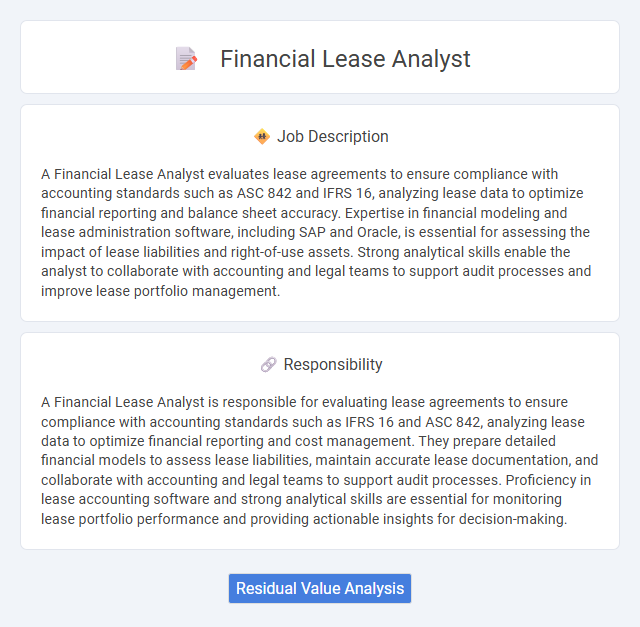
A Financial Lease Analyst evaluates lease agreements to ensure compliance with accounting standards such as ASC 842 and IFRS 16, analyzing lease data to optimize financial reporting and balance sheet accuracy. Expertise in financial modeling and lease administration software, including SAP and Oracle, is essential for assessing the impact of lease liabilities and right-of-use assets. Strong analytical skills enable the analyst to collaborate with accounting and legal teams to support audit processes and improve lease portfolio management.
Individuals with strong analytical skills and attention to detail are likely to be suitable for a Financial Lease Analyst role, given the nature of evaluating lease agreements and financial data. Those who demonstrate proficiency in financial modeling, risk assessment, and communication are probably better equipped to handle the responsibilities effectively. Conversely, candidates lacking interest in finance or who struggle with quantitative analysis may find this position less suitable.
Qualification
A Financial Lease Analyst must possess a strong background in finance, accounting, or economics, often demonstrated by a bachelor's degree in these fields. Proficiency in lease accounting standards such as IFRS 16 and ASC 842 is essential, along with advanced skills in financial modeling, data analysis, and software like Excel and ERP systems. Experience with lease portfolio management, risk assessment, and financial reporting ensures accuracy in evaluating lease agreements and supporting strategic decision-making.
Responsibility
A Financial Lease Analyst is responsible for evaluating lease agreements to ensure compliance with accounting standards such as IFRS 16 and ASC 842, analyzing lease data to optimize financial reporting and cost management. They prepare detailed financial models to assess lease liabilities, maintain accurate lease documentation, and collaborate with accounting and legal teams to support audit processes. Proficiency in lease accounting software and strong analytical skills are essential for monitoring lease portfolio performance and providing actionable insights for decision-making.
Benefit
Financial Lease Analysts might experience increased career growth opportunities due to their expertise in evaluating lease agreements and financial risks. They are likely to benefit from enhanced decision-making skills that improve overall financial performance for their organizations. This role probably offers job stability as businesses continually assess lease financing to optimize capital allocation.
Challenge
A Financial Lease Analyst likely faces the challenge of accurately assessing complex lease agreements to ensure compliance with accounting standards and optimize financial outcomes. They probably encounter difficulties in managing large volumes of data and reconciling discrepancies between contract terms and financial records. Balancing detailed analysis with tight deadlines may also present ongoing obstacles in this role.
Career Advancement
Financial Lease Analysts develop expertise in lease accounting, risk assessment, and financial modeling, positioning themselves for roles such as Senior Analyst or Finance Manager. Mastery of lease standards like ASC 842 and IFRS 16 enhances opportunities in corporate finance and consulting. Continuous skill development in data analytics and regulatory compliance drives career progression within financial services and real estate sectors.
Key Terms
Residual Value Analysis
A Financial Lease Analyst specializing in Residual Value Analysis evaluates the estimated worth of leased assets at the end of lease terms to ensure accurate lease pricing and risk assessment. They analyze market trends, asset depreciation rates, and historical data to forecast realistic residual values that impact lease profitability and financial reporting. Expertise in financial modeling, accounting standards like IFRS 16, and industry-specific asset valuation is crucial for optimizing residual value assumptions.
 kuljobs.com
kuljobs.com